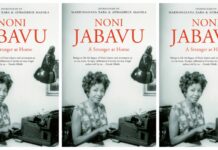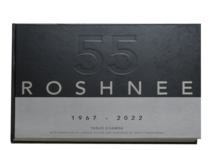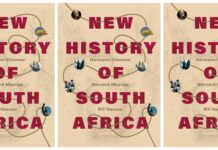Following the publication of Jacques Pauw’s The President’s Keepers, the State Security Agency (SSA) sent a cease-and-desist letter to the publishers of the book to get it pulled off the shelves.
The book exposes President Jacob Zuma’s ties to gangsters, as well as his income and tax affairs. It also reveals that a top-secret state intelligence programme used as much as R1-billion of taxpayers’ money to acquit Jacob Zuma of his corruption charges. The South African Revenue Services has threatened to bring criminal charges against Pauw for publishing confidential taxpayer information. Arthur Fraser, director-general of the SSA accused Pauw of committing “classical journalist deception†with the claims he made in the book.
[UPDATE 1]: On Tuesday, Pauw shared his lawyers’ response to the SSA’s letter on Facebook. On behalf of Pauw and his publishers, the lawyers denied that the book violates intelligence statutes and said the SSA has not proved what factual inaccuracies Pauw made in the book. They also said the information published in the book was true and it was in the public interest. Citing the already-wide distribution of the book and the timing of the threatened interdict, Pauw’s lawyers said they would “not desist from making the book available to the public, will not withdraw the book from the market and will not retract anything therein contained.â€
[UPDATE 2]: According to a report on eNCA.com, the SSA laid charges against Pauw on Wednesday 8 November “relating to the contravention of certain sections of the Intelligence Services Act.â€
Meanwhile, some folks from Durban told The Daily Vox the book was a good thing because they said it was important for South Africans to be informed about corruption within government.
#ThePresidentsKeepers: “If this the best way to let people know the truth then so be it”
Spokesperson of advocacy organisation Right2Know, Busi Mtabane, told The Daily Vox that while there may be acts of law that the government could use to try prevent the publication of state information, these are unconstitutional. “There are several laws which contain secrecy provisions that could be used to try stop info from becoming public, such as the Intelligence Service Act or the existing Protection of Information Act that comes from the apartheid years. But these laws are blatantly unconstitutional, which is why the state is too afraid to use them – because that could result in the laws being scrapped entirely,†she said.
Mtabane said that SSA’s attempt to take legal action against Pauw is an intimidation tactic, as there are no laws that prevent journalists from releasing information they feel is of public interest. “In fact we have the Promotion of Access to Information Act (PAIA) which promotes the right of access to any information held by the state and any information that is held by another person and that is required for the exercise or protection of any rights,†she added.
This kind of censorship of the media harkens back to the tactics of the apartheid government to try and intimidate critical media. Veteran journalist Max du Preez said Zuma has adopted apartheid intimidating tactics and that the book was the most important book published in South Africa since 1994.
Many books, newspapers and radio stations exposing similar content were banned during apartheid. Here are some important publications and radio stations that were banned under the regime.
1. Miriam Tlali: Amandla
Tlali’s Amandla is regarded as one of the most important novels in understanding the 1976 Soweto Uprising. The book was published in 1980 but was banned by the apartheid government several weeks after it was published. The book gives a detailed narrative of the Uprising and its aftermath.
2. Nadine Gordimer: Burger’s Daughter
Burger’s Daughter is a novel written by Nobel-winning author Nadine Gordimer, which was published in the United Kingdom in 1979. The book talks about how a group of white anti-apartheid activists were trying to overthrow the apartheid government. The book also looks at white consciousness “trapped in unearned and discomforting privilegeâ€. A month after the book was published in London, the apartheid government prohibited the importing of the book through the Publications Control Board. This was just one of several books written by Gordimer which were banned by the apartheid government, but widely read around the world.
3. Steve Biko: I Write What I Like
Biko’s collection of columns, speeches and interviews covered topics ranging from black consciousness and black resistance of apartheid during the 1970s. Biko was under a publishing ban when he wrote the book, finishing it in 1972. It was only published in 1978, after his brutal death at the hands of the apartheid police.
4. Alex La Guma: And a Threefold Cord
Considered one of the most influential black authors of the 20th century, La Guma wrote And A Threefold Cord to address the the tensions and struggles of communities living in shacks during apartheid. Most of his work was banned under the the Publications Act and he was persecuted under the Suppression of Communism Act and eventually exiled. The book was banned for highlighting the gross violations of human rights and lived experiences of poor people under apartheid.
5. The Guardian/New Age
Before it was banned and closed down, the Guardian exposed the ill-treatment of black workers under their white employers and other labour-related issues for over 26 years. When it eventually collapsed due to political pressure from the apartheid government, it reemerged under a different name, New Age, where the publication continued to expose issues such as child abuse and forced labour. Fifty-five staff members from the publication’s editorial team were arrested by the government and the paper was banned because the government accused the publication for being a communist propaganda tool.
6. Radio Freedom
Banned in 1969, Radio Freedom was one of South Africa’s early resistance media, which exposed government oppression, challenging the regime’s legitimacy, documenting the lived realities of marginalised black people under white rule and assisted in the forming of cohesion amongst struggle activists. The channel was mainly a broadcast station for the African National Congress, which was seen as monumental as 90% of media of press was controlled by the apartheid government.
Featured image by Nolwandle Zondi
*Editor’s note: This article has been updated with comment from Jacques Pauw’s lawyers, and recent developments relating to charges.Â









